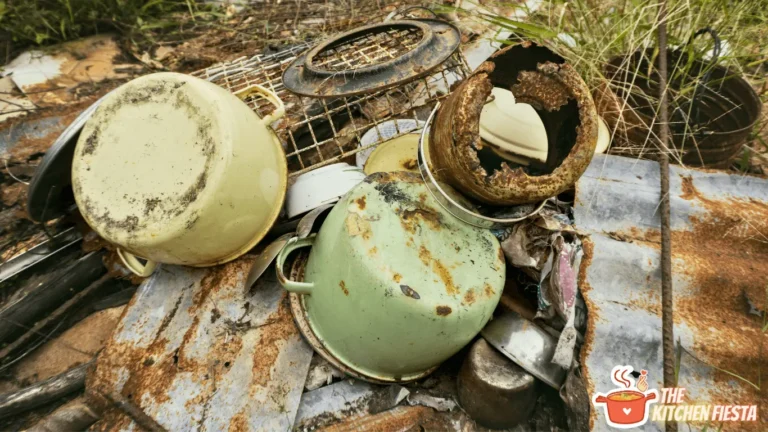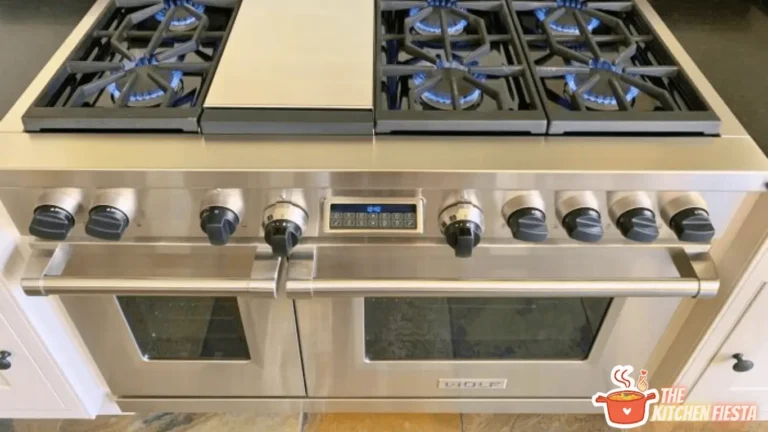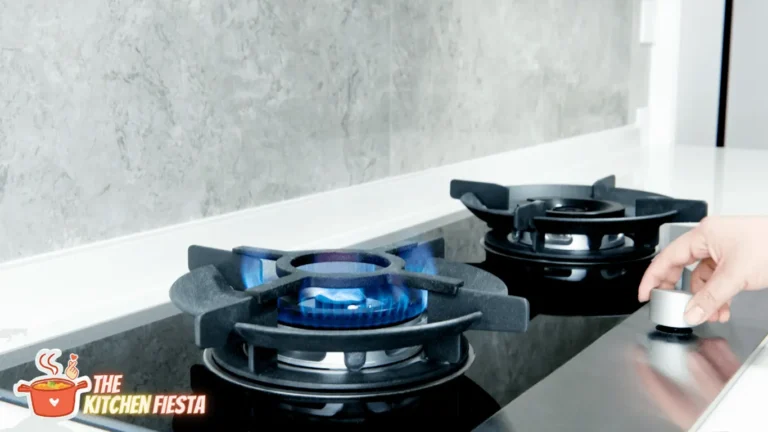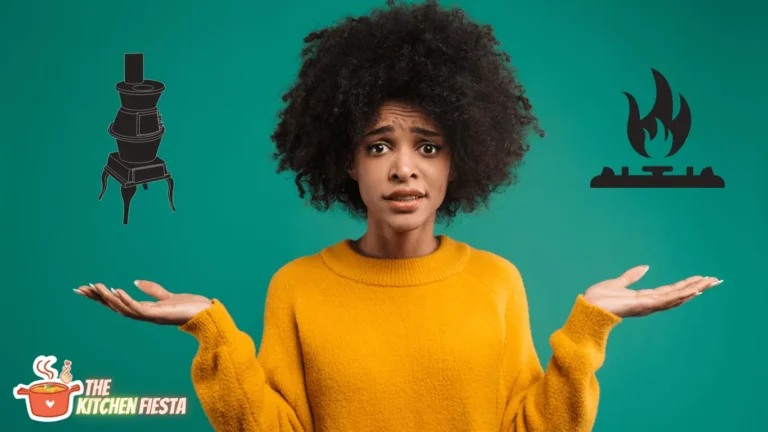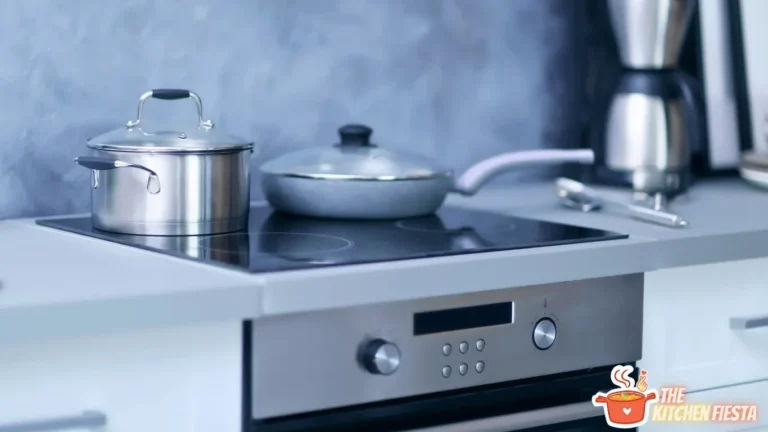Is It Normal to Smell Gas From Stove? Causes, Risks, and Solutions

In kitchen safety, the smell of gas from a stove is a warning that demands immediate attention. While it’s not uncommon for homeowners to encounter this issue, it is far from normal and should never be ignored.
This unsettling scent can indicate potential hazards, ranging from gas leaks to blocked ventilation systems, and the consequences can be dire – think explosions, fires, and endangerment of life and property. Identifying the root cause of the gas odor is paramount, but attempting a DIY fix is out of the question. Swift action is essential, involving the expertise of a professional to assess and resolve the problem.
In this article, we delve into the causes, risks, and solutions associated with the smell of gas from a stove, providing a comprehensive guide to ensuring the safety of your home and loved ones.
The Basics Of Gas Stoves
Gas stoves are common in most households and are used for cooking and preparing meals. They are an essential appliance that allows for efficient and quick cooking. However, it is common for people to smell gas from their stoves. While it may be concerning, it is essential to understand that there are a few reasons why gas stoves may emit a gas odor.
One of the most common reasons why a gas stove may smell like gas is because of a small amount of gas that is released when the stove is turned on. This is normal and should not be a cause for concern. The gas smell should only last a few seconds before the flame ignites. However, if the gas odor persists or is very strong, it may indicate a gas leak.
Another reason why a gas stove may smell like gas is because of a problem with the oven ignitor. If the ignitor goes bad, it will cause the gas to flow out of the range, but it may not be able to create the spark to light the flame. Igniters are fickle and often need to be replaced over time, which can lead them to be unable to light.
It is important to note that a gas leak smells different than the typical gas odor emitted when a gas stove is turned on. A gas leak smells like rotten eggs, and if you suspect a gas leak, it is essential to immediately go outside and call 911 or the gas company’s emergency line.
Gas Stove Operation
Gas stoves are popular for many homeowners because they provide instant heat and precise temperature control. However, some people might be concerned if they smell gas from their stoves.
When a gas stove is turned on, gas flows through the burner and ignites to produce a flame. Belling gas for a few seconds before the flame appears is normal. This is because the gas is released into the air and has not yet been ignited. Once the flame appears, the gas odor should disappear.
If the gas odor persists, it could indicate a gas leak. Gas leaks are rare but can be dangerous if not addressed promptly. If you suspect a gas leak, turn off the stove immediately and evacuate the area. Contact a gas professional to inspect the stove and gas lines.
Keeping the stove clean and debris-free is essential to ensure proper operation. Food particles and grease can clog the burners and cause them to malfunction. Regular cleaning of the stove and burners can prevent this from happening.
Identifying Gas Smells
Gas leaks can be dangerous and should be taken seriously. It’s essential to know how to identify a gas smell to prevent potential accidents. Here are some ways to identify gas smells:
- Rotten egg smell: Natural gas is odorless, but gas companies add a chemical called mercaptan to give it a distinctive smell. It smells like rotten eggs or sulfur. If you smell this, it could be a gas leak, and you should take immediate action.
- Hissing sound: If you hear a hissing sound near your gas appliances, it could indicate a gas leak. Turn off the gas supply immediately and call a professional to inspect your gas line.
- Physical symptoms: Exposure to natural gas can cause physical symptoms such as dizziness, headache, nausea, and fatigue. If you experience these symptoms and suspect a gas leak, leave the area immediately and call for help.
- Gas meter: Your gas meter can also help identify a gas leak. If the needle on the meter moves even though no gas appliances are in use, it could indicate a leak.
It’s important to note that a faint smell of gas when you first turn on your gas appliances is typical. However, if the smell persists or strengthens, it could indicate a problem.
If you suspect a gas leak, follow these steps:
- Leave the area immediately and avoid using electrical devices or open flames.
- Call your gas company’s emergency line or 911 to report the leak.
- Do not return to the area until it has been deemed safe by a professional.
In conclusion, identifying a gas smell is crucial to prevent gas leaks and potential accidents. If you suspect a gas leak, take immediate action and seek professional help.
Possible Causes of Gas Smell
When a gas stove emits a smell of gas, it can be an alarming sign. While it’s normal for a gas stove to produce a faint smell when it’s first turned on, a strong and persistent smell can cause concern. Here are a few possible causes of gas smell from a gas stove:
- Gas leakage: A gas leak is the most common cause of a strong and persistent gas smell from a gas stove. A gas leak can occur due to a damaged gas line, a loose connection, or a faulty valve. If you suspect a gas leak, it’s essential to turn off the gas supply and evacuate the area immediately. Contact a professional to inspect and repair the gas line.
- Dirty burners: Dirty burners can cause a gas smell from a gas stove. Food residue, grease, and debris can accumulate on the burners and clog the gas ports, causing incomplete combustion and a gas smell. Clean the burners regularly with soap and water to avoid this issue.
- Malfunctioning ignitor: A malfunctioning ignitor can cause a gas smell from a gas stove. The ignitor is responsible for creating a spark to ignite the gas. If it’s faulty, it may not light the gas, causing it to accumulate and emit a smell. Replace the ignitor if it’s not working correctly.
- Pilot light issues: A gas stove with a pilot light can emit a gas smell if the pilot light is not working correctly. The pilot light is responsible for lighting the gas when the stove is turned on, and if it’s not working, the gas can accumulate and emit a smell. Check the pilot light and the gas supply line to ensure they work correctly.
- Faulty gas valve: A faulty gas valve can cause a gas smell from a gas stove. The gas valve controls the gas flow to the stove, and if it’s not working correctly, it can cause gas to leak and emit a smell. Contact a professional to inspect and repair the gas valve if necessary.
It’s essential to address any gas smell from a gas stove promptly. If you suspect a gas leak, evacuate immediately and contact a professional to inspect and repair the gas line. Regular cleaning and maintenance of the gas stove can prevent the gas smell caused by dirty burners or malfunctioning components.
Potential Dangers
Gas stoves are a common appliance in many households. Still, they can pose potential dangers if not properly maintained or used. It is normal for gas stoves to emit a small amount of gas when turned on or off, but a strong gas smell could indicate a problem that needs to be addressed.
Here are some potential dangers associated with gas stoves:
- Gas leaks: One of the most significant dangers of gas stoves is the risk of gas leaks. Gas leaks can occur due to a damaged gas line or a faulty appliance. Gas leaks can lead to explosions or fires, which can cause serious injuries or even death. Addressing any gas leaks immediately is essential by turning off the gas supply and contacting a professional to fix the issue.
- Carbon monoxide poisoning: Gas stoves can also emit carbon monoxide. This colorless and odorless gas can be deadly in high concentrations. Carbon monoxide poisoning can cause headaches, dizziness, nausea, and confusion. Having a carbon monoxide detector in the kitchen and having the stove properly ventilated to prevent carbon monoxide buildup is crucial.
- Fire hazards: Gas stoves can also pose a fire hazard if not used properly. Leaving flammable items such as paper towels or curtains too close to the stove can cause them to catch fire. Additionally, leaving the stove unattended while cooking can lead to fires. It is essential to keep the stove area clear of any flammable items and never leave it unattended while in use.
Immediate Actions to Take
If someone smells gas from their stove, it is essential to take immediate action to ensure their safety. Here are some steps to follow:
- Evacuate the area: If you smell gas, you should first evacuate the area. Do not turn on or off any electrical switches, including lights or appliances, as this can create a spark that could ignite the gas.
- Call for help: Immediately contact the gas company or emergency services. They will be able to advise you on what to do next and send someone to investigate the situation.
- Do not return to the area until it is safe: Even if you don’t smell gas anymore, do not return to the area until a professional has deemed it safe.
- Do not attempt to fix the problem yourself: Gas leaks can be hazardous and should only be handled by trained professionals. Do not attempt to fix the problem yourself, as this can lead to further complications and put your safety at risk.
- Keep the area ventilated: If you cannot evacuate immediately, open windows and doors to allow for ventilation. This can help to reduce the risk of an explosion or fire.
Remember, if you smell gas, you must take immediate action to ensure your safety. Do not hesitate to call for help and follow the steps outlined above.
Preventive Measures
To prevent gas leaks from stoves, homeowners can take several preventive measures. Here are some of the most important ones:
- Regular maintenance: Regularly maintaining gas stoves is crucial to prevent gas leaks. Homeowners should have their stoves inspected by a qualified professional at least once a year. This inspection should include checking the gas lines, burners, and other stove components.
- Proper installation: Gas stoves should be installed by a qualified professional. Improper installation can lead to gas leaks, so hiring someone who knows what they’re doing is essential.
- Proper ventilation: Proper ventilation is essential to prevent gas buildup in the kitchen. Homeowners should ensure their kitchen is well-ventilated, with a range hood or exhaust fan that vents outside.
- Proper use: Homeowners should use their gas stoves to prevent leaks. This includes never leaving the stove unattended while it’s in use, never using it to heat the house, and never using it to warm up the kitchen.
- Gas detectors: Installing a gas detector in the kitchen can protect against gas leaks. These detectors can alert homeowners to gas in the air before it becomes a severe problem.
Professional Inspection and Maintenance
If a faint smell of gas persists after lighting the stove or oven, it is recommended to have a professional inspection and maintenance performed. Regular maintenance ensures that the appliance is functioning correctly and prevents potential hazards.
During a professional inspection, a technician will check for any leaks, damages, or malfunctions that could be causing the gas smell. They will also clean the burners, check the ignition system, and ensure all parts work correctly.
It is essential to schedule regular maintenance for gas stoves and ovens, mainly if they are used frequently. The manufacturer’s instructions should be followed for maintenance schedules and procedures.
In addition to regular maintenance, there are some steps that homeowners can take to help prevent gas leaks and odors. These include:
- Checking the gas connections regularly for any signs of damage or wear
- Ensuring that the stove or oven is properly installed and vented
- Keeping the area around the stove or oven clean and free from debris
- Avoiding using the stove or oven as a source of heat for the home
- Never leave the stove or oven unattended while in use
Following these tips and scheduling regular maintenance, homeowners can help ensure that their gas stove or oven functions safely and efficiently.
Conclusion
In conclusion, a faint gas smell from a stove is typical. It serves as a safety feature to detect potential leaks early on. However, if the smell becomes overpowering or persistent, it may indicate a gas leak, and immediate action should be taken to address the issue. The distinct sulfur-like odor associated with gas leaks is intentional, serving as a warning sign. Regular maintenance and inspection of gas appliances are crucial to prevent leaks and ensure household safety.
Understanding the normal levels of gas odor and being vigilant about unusual smells can help maintain a secure cooking environment and avoid potential hazards. Safety should always be a top priority when dealing with gas appliances. Promptly attention to gas-related concerns is essential for a secure and well-functioning stove.
Frequently Asked Questions
What causes a gas stove to emit a gas smell when turned on?
A gas stove can emit a gas smell when turned on for various reasons. Common causes include a faulty ignitor, a gas leak, or a clogged burner. Identifying the cause of the gas smell is essential to determine the appropriate solution.
How can I tell if my gas stove is leaking gas?
If you suspect that your gas stove is leaking gas, you should immediately turn off the stove and open the windows to ventilate the area. You can then check for the smell of gas, often described as a rotten egg odor. Another way to detect a gas leak is to listen for a hissing sound near the stove.
Is it safe to use a gas stove if I smell gas?
No, using a gas stove is unsafe if you smell it. Gas leaks can be dangerous and can lead to fires or explosions. If you smell gas, immediately turn off the stove and evacuate the area. You should then contact a professional to inspect and repair your gas stove.
Can a gas stove emit a gas smell even when it’s off?
Yes, a gas stove can emit a gas smell even when off. This can happen if there is a gas leak in the stove or the gas line. It’s essential to regularly inspect your gas stove and gas lines to prevent gas leaks.
What should I do if I smell gas coming from my stove?
If you smell gas coming from your stove, you should immediately turn off the stove and evacuate the area. You should then contact a professional to inspect and repair your gas stove. Please do not attempt to fix the stove yourself, as it can be dangerous.
How do I get rid of the gas smell from my stove?
To get rid of the gas smell from your stove, you should first identify and fix the cause of the gas smell. You can then ventilate the area by opening windows and turning on fans. You can also use air fresheners or odor absorbers to help eliminate the gas smell.

